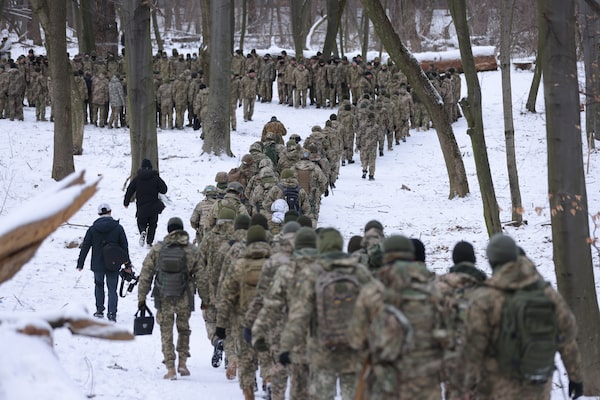Canadian military trainers watch over Ukrainian soldiers storming a building during a live-fire demonstration put on for Prime Minister Justin Trudeau at the International Peacekeeping and Security Centre near Yavoriv, Ukraine, on July 12, 2016.Adrian Wyld/The Canadian Press
Canada is extending its soldier-training mission in Ukraine for three years and supplying non-lethal defensive equipment and intelligence sharing to the country’s armed forces amid fears of a Russian invasion.
Prime Minister Justin Trudeau made the announcement Wednesday at the conclusion of a three-day virtual cabinet retreat. The Ukrainian Canadian Congress, which along with the Ukrainian government had lobbied for offensive weapons, criticized the decision as insufficient.
The current 200-person Canadian Armed Force training mission will be doubled as a signal of Canada’s commitment to Ukraine and a message against Russian aggression, Mr. Trudeau told a news conference.
U.S. offering Russia a ‘serious diplomatic path’ in response to Ukraine demands, Blinken says
Opinion: Sanctions will hurt Russia if it invades Ukraine, but crippling pain is far from assured
“To support Ukraine, I authorize the extension of Operation Unifier for three years and I will be expanding this training mission,” he said.
“This is a $340-million commitment. As part of this, I authorized the Canadian Armed Forces to deploy 60 personnel within days to join the approximate 200 women and men already on the ground with further capacity to increase the number of people on the ground up to 400.”
Ukraine and Canadian-Ukrainian organizations had been pressing Ottawa to provide offensive gear, such as anti-tank weapons.
“We’re pleased to see Operation Unifier extended and enlarged,” said Ihor Michalchyshyn, executive director of the Ukrainian Canadian Congress, which represents 1.4 million Ukrainian Canadians. “We are disappointed the government has not yet made a decision to join our NATO allies to provide Ukraine with weapons. We think that it is the most effective way to help Ukrainians defend themselves.”
Prime Minister Justin Trudeau speaks during a news conference about Canada's military support for Ukraine in Ottawa on Jan. 26. The protection and safety of Canadian soldiers is 'paramount' in this mission, Mr. Trudeau said.BLAIR GABLE/Reuters
A senior government official said Ottawa has not ruled out supplying smalls arms to Ukraine’s military. The Globe is not identifying the official because they were not authorized to discuss the matter. A decision on lethal weapons is weeks away, the source said.
The Prime Minister said Canada will provide non-lethal equipment such as sniper night scopes and armoured body vests, but he did not explain why offensive weapons were not being provided.
“We know that the solution to this tension must be diplomatic, not military,” he said.
Mr. Trudeau indicated that Canadian troops would be pulled out of the country in the event Russian President Vladimir Putin orders an invasion.
“This is a training mission,” Mr. Trudeau said. “It is not a combat mission. The protection and safety of Canadian soldiers is paramount in this mission … in the event of a Russian incursion or invasion of Ukraine, we will ensure Canadian military remain safe.”
Last week, the Prime Minister announced that Ottawa was giving Ukraine a loan of up to $120-million aimed at bolstering the country’s economy in the face of the ongoing threats it faces from Russia. Another $50-million will be provided in developmental aid, Mr. Trudeau said Wednesday.

Civilian participants in a Kyiv Territorial Defence unit train in a forest in Kyiv, Ukraine, on Jan. 22. Across Ukraine, thousands of civilians are participating in such groups to receive basic combat training and in time of war would be under direct command of the Ukrainian military.SeanGallup/Getty Images
Mr. Trudeau said Defence Minister Anita Anand is planning to visit Kyiv next week, and will also go to the nearby Baltic country of Latvia, where 1,000 Canadian troops are stationed.
Russia has more than 100,000 troops across Ukraine’s eastern borders, along with tanks and other heavy artillery, raising fears of an invasion, something Russia’s ambassador to Canada, Oleg Stepanov, denied in an interview with The Globe and Mail.
The Russian envoy accused Deputy Prime Minister Chrystia Freeland, a Canadian of Ukrainian descent whose mother helped draft Ukraine’s constitution, of having an undue and negative influence on Canadian foreign policy toward Russia.
Ms. Freeland defended her role Wednesday in the cabinet decision on Ukraine.
“This is a direct challenge to the rules-based international order and an attempt to replace it with a world where might makes right and where great powers, nuclear armed powers, have the authority to redraw the borders, dictate the foreign policies, and even rewrite the constitutions of sovereign democracies whose only fault is that they are smaller and their militaries are not as powerful,” she said.
The Prime Minister said he spoke to a European Union representative Wednesday to reaffirm Canada’s support for tough economic sanctions if Russia crosses the border into Ukraine.
Foreign Affairs Minister Mélanie Joly said she held discussions in Kyiv last week about how Canada can provide financial support to Ukraine to shore up its economy, which the EU has also done.
For subscribers: Get exclusive political news and analysis by signing up for the Politics Briefing.
 Robert Fife
Robert Fife